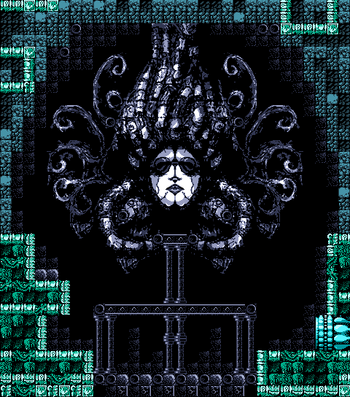Tags: Visual edit apiedit |
(→Etymology: debt is written with a b) Tag: Visual edit |
||
| (5 intermediate revisions by 4 users not shown) | |||
| Line 9: | Line 9: | ||
== Location == |
== Location == |
||
| − | Ophelia's head can be seen in mid to upper left portions of [[Ukkin-Na]]. However, her body is located in the lower right portion of [[Edin]] |
+ | Ophelia's head can be seen in mid to upper left portions of [[Ukkin-Na]]. However, her body is located in the lower right portion of [[Edin]]. |
== Etymology == |
== Etymology == |
||
| − | In Shakespeare's ''Hamlet''<ref name="hamlet" />, Ophelia is a young woman who ultimately goes mad and drowns herself.<ref>Taken from [https://www.reddit.com/r/axiomverge/comments/37flnm/spoilers_significance_of_names_ties_to_realworld/ this post] on Reddit.</ref> This is probably related to the [[Rusalki]] being "water machines", as well as the [[Notes]] that imply Ophelia speaks [https://en.wikipedia.org/wiki/Early_Modern_English Early Modern English]. Shakespeare chose that name because in Ancient Greek |
+ | In Shakespeare's ''Hamlet''<ref name="hamlet" />, Ophelia is a young woman who ultimately goes mad and drowns herself.<ref>Taken from [https://www.reddit.com/r/axiomverge/comments/37flnm/spoilers_significance_of_names_ties_to_realworld/ this post] on Reddit.</ref> This is probably related to the [[Rusalki]] being "water machines", as well as the [[Notes]] that imply Ophelia speaks [https://en.wikipedia.org/wiki/Early_Modern_English Early Modern English]. Shakespeare chose that name because in Ancient Greek οφέλη (o-'''''phe'''''-læ) means "a great benevolent act" or "gift" (like Theodora<ref name="theodora">[https://en.wikipedia.org/wiki/Theodora_(given_name) ''Theodora''] is a feminine given name, which derives from the Greek words θεός, theos, "god" and δῶρον, doron, "gift".</ref>), but it sounds really close to οφειλή (o-phe-'''''læ'''''), which means "a great debt (or sin) to pay for". The pair of words, almost homophones (only one emphasis away), make Ophelia great as a literary name, describing the dual nature of a character. The good and evil counterparts were too poetic for Shakespeare to ignore, and the same could be said for the [[Developer|creator of Axiom Verge]], since it shows Ophelia (as a Rusalka) is questionable in nature. |
== Additional Images == |
== Additional Images == |
||
Revision as of 18:32, 4 October 2018
Description

Composite image of Ophelia.
Ophelia is the Rusalka who originally came up with the plan to create a clone of Trace in order to combat Athetos. She has a benevolent demeanor, apologizing to Trace when Elsenova, in her anger, used the nanogates to kill Trace for not agreeing to kill Athetos. When Trace nearly succumbs to Athetos' pathogen, Ophelia is somehow able to cure Trace.
Although Ophelia, being a Rusalka, is considered a war machine, she seems to be more akin to a combat medic than a soldier. She is most likely the outsider being discussed in The Outsider (Note) and Reply: The Outsider (Note). This is further supported by the fact that Ophelia is the only Rusalka with a non-Slavic name (the name Ophelia originates from Shakespeare's Hamlet[1]), as well as the only Rusalka depicted facing fully front, as opposed to in profile.
Traits
- Unlike Elsenova, Ophelia can speak in plain, unbroken English. This seems to indicate that the Rusalki were given different personality types based on some outside factor (perhaps each akin to one of their creators).
- At the start of the game, Ophelia is inert and inactive due to lack of repairs. However, Trace is able to awaken her at Elsenova's suggestion by activating the Remote Drones.
Location
Ophelia's head can be seen in mid to upper left portions of Ukkin-Na. However, her body is located in the lower right portion of Edin.
Etymology
In Shakespeare's Hamlet[1], Ophelia is a young woman who ultimately goes mad and drowns herself.[2] This is probably related to the Rusalki being "water machines", as well as the Notes that imply Ophelia speaks Early Modern English. Shakespeare chose that name because in Ancient Greek οφέλη (o-phe-læ) means "a great benevolent act" or "gift" (like Theodora[3]), but it sounds really close to οφειλή (o-phe-læ), which means "a great debt (or sin) to pay for". The pair of words, almost homophones (only one emphasis away), make Ophelia great as a literary name, describing the dual nature of a character. The good and evil counterparts were too poetic for Shakespeare to ignore, and the same could be said for the creator of Axiom Verge, since it shows Ophelia (as a Rusalka) is questionable in nature.
